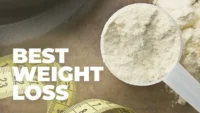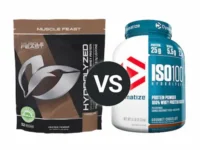Knowledge BaseYou're Questions Answered
Is whey protein powder good for weight loss?
Whey protein powder is a popular dietary supplement known for its high-quality protein content and quick digestibility. It is often used by athletes, bodybuilders, and fitness enthusiasts to support muscle growth and recovery. In addition to its muscle-building properties, whey protein powder can also be beneficial for weight loss. Below, we explore the ways in which whey protein powder can aid in weight loss and the considerations to keep in mind when using it for this purpose.
Benefits of Whey Protein Powder for Weight Loss
1. High Satiety and Reduced Appetite
Whey protein is highly satiating, meaning it can help you feel full for longer periods. This is largely due to the protein's ability to regulate hunger hormones, such as ghrelin, which can reduce overall calorie intake. By promoting satiety, whey protein can help control cravings and prevent overeating, making it easier to stick to a calorie-restricted diet1.
2. Supports Lean Muscle Mass
Maintaining or increasing lean muscle mass is important for weight loss, as muscle tissue burns more calories at rest than fat tissue. Whey protein provides a rich source of essential amino acids, particularly leucine, which plays a key role in muscle protein synthesis. Consuming whey protein, especially in combination with resistance training, can help preserve muscle mass during weight loss, thus supporting a higher metabolic rate2.
3. Thermic Effect of Protein
Protein has a higher thermic effect compared to fats and carbohydrates, meaning the body burns more calories digesting and metabolizing protein. Consuming whey protein can slightly increase calorie expenditure, which can contribute to overall weight loss efforts. This effect, although modest, can add up over time and support a negative energy balance3.
4. Convenient and Low-Calorie
Whey protein powder is a convenient and versatile supplement that can be easily incorporated into meals and snacks. It is typically low in calories and can be mixed with water, milk, or other low-calorie liquids. This makes it an efficient way to increase protein intake without significantly increasing calorie consumption. It can also be used as a meal replacement or post-workout shake4.
Considerations for Using Whey Protein for Weight Loss
1. Caloric Intake
While whey protein can aid in weight loss, it is important to consider the total caloric intake. Consuming more calories than you burn, even from protein, can hinder weight loss progress. It is essential to incorporate whey protein into a balanced, calorie-controlled diet.
2. Quality of the Protein Powder
Choosing a high-quality whey protein powder with minimal added sugars, fats, and artificial ingredients is crucial. Some protein powders contain added sugars or fillers that can increase calorie intake and counteract weight loss efforts. Opt for products with simple ingredient lists and transparent labeling.
3. Individual Tolerance
Some individuals may experience digestive discomfort from whey protein, especially if they are lactose intolerant. In such cases, opting for a lactose-free whey protein isolate or a different type of protein powder may be beneficial.
- Leidy, H. J., Carnell, N. S., Mattes, R. D., & Campbell, W. W. (2007). Higher protein intake preserves lean mass and satiety with weight loss in pre-obese and obese women. Obesity, 15(2), 421-429.
- Phillips, S. M. (2014). A brief review of higher dietary protein diets in weight loss: A focus on athletes. Sports Medicine, 44(2), 149-153.
- Paddon-Jones, D., & Leidy, H. (2014). Dietary protein and muscle in older persons. Current Opinion in Clinical Nutrition & Metabolic Care, 17(1), 5-11.
- Farnsworth, E., Luscombe, N. D., Noakes, M., Wittert, G., Argyiou, E., & Clifton, P. M. (2003). Effect of a high-protein, energy-restricted diet on weight loss and energy expenditure after weight stabilization in hyperinsulinemic subjects. International Journal of Obesity, 27(5), 582-590.
Related Questions
Related Reviews

Your Answer
We are a participant in the Amazon Services LLC Associates Program, an affiliate advertising program designed to provide a means for us to earn fees by linking to Amazon.com and affiliated sites.



